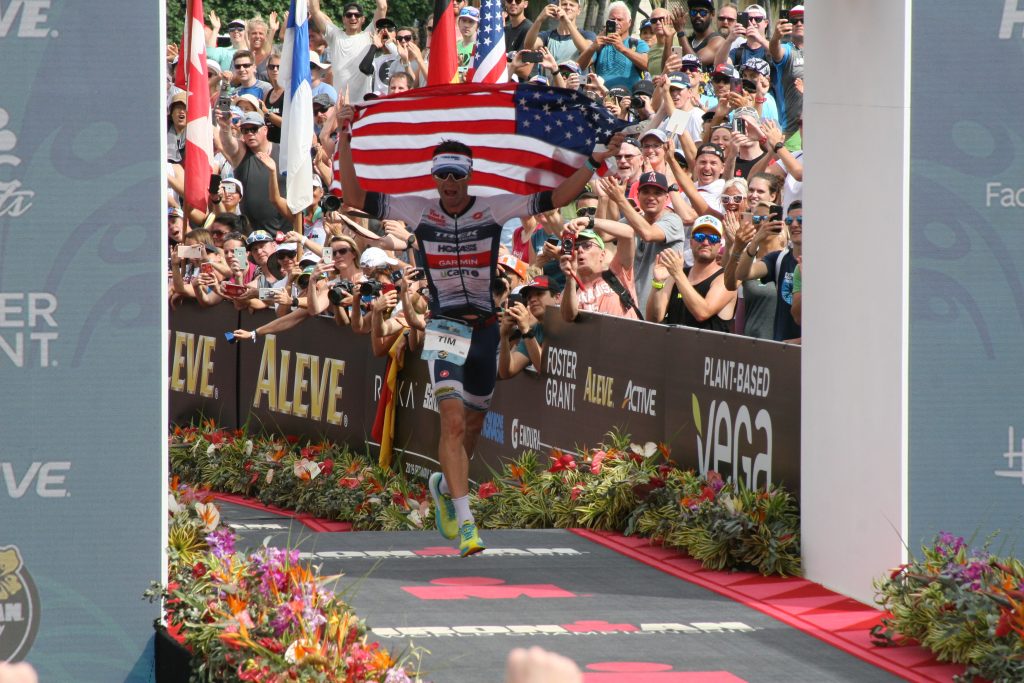IRONMAN Poised to Return to Big Island in 2021
After cancelling its signature triathlon in 2020 for the first time in 40 years, IRONMAN plans to swim, bike and run its way back to the Big Island this October. Though, it is not officially a done deal.
Several annual events on the Big Island that schedule early in the calendar year, such as the Kona Brewer’s Festival and the Big Island International Marathon, went virtual in 2021 due to the continued public health threat surrounding COVID-19. The IRONMAN World Championship will not follow in their footsteps.
“To date, the event remains as scheduled and preparations have been ongoing,” the IRONMAN communications team wrote in an email to Big Island Now, adding that adjustments to that plan are possible should they prove necessary.

The grueling 140.6-mile trek across the Big Island’s leeward side is set to begin Oct. 9, presumably preceded by the customary week of events leading to the sport’s grandest race, which include the Keiki Dip-n-Dash and Fun Run, the Parade of Nations down Ali´i Drive and a host of various community improvement events involving locals and race participants alike.
However, the County of Hawai´i said nothing is yet set in stone, adding it is “only in early conversations” with IRONMAN.
“We are monitoring the COVID-19 situation closely and will continue to do so moving forward, which will help inform our decisions regarding how we will allow IRONMAN to proceed,” said Cyrus Johnasen, communications director for the Office of Mayor Mitch Roth.
Johnasen added that while the county has the authority to shut down the race for a second straight year should that prove necessary, its relationship with IRONMAN is solid and longstanding enough that he does not expect friction with race officials regardless of the chosen path forward.
Much will depend on COVID-19 vaccination rates across the state, country and world.
Hawai´i this week surpassed 500,000 vaccinations administered, with around 26% of its population fully vaccinated and another 16% partially vaccinated, according to a New York Times report tracking inoculation rates in all 50 states. Governor David Ige has indicated in recent interviews he expects visitor arrivals and the tourism industry to return to some sort of normal by mid- to late-summer, an indication that IRONMAN would also be welcomed back a few months later.
As of Friday, March 19, the US Centers for Disease Control and Prevention reported that more than 77 million Americans had received at least one dose of vaccine, while nearly 42 million were considered fully vaccinated. President Joe Biden has asked all states to make approved vaccines available to every person 16 years of age and older by May 1, which Hawai´i has announced plans to do.
This is all to say that the Big Island, and the state as a whole, will likely be ready to accommodate the tens of thousands of competitors, family members and race enthusiasts that descend on West Hawai´i for IRONMAN each October. Most Americans, if not all, planning to attend will have had the opportunity to be vaccinated. The state will also have the mechanism of its Safe Travels Program to fall back on for US residents who choose not to vaccinate, implementing a testing and quarantine system as an extra layer of protection should such still prove necessary.

The wrinkle is the international flavor of IRONMAN, which draws thousands of athletes and spectators from dozens of countries each year. Vaccine rollout plans are occurring at wildly disparate rates across the world, with many countries yet to meaningfully begin the inoculation process. Those countries are located across portions of Africa, the Middle East, South America and East Asia, among other regions.
However, with nearly six months until race day, considerable time remains to close the vaccination gap. Versions of the Safe Travels program have also already been extended to Canada, Japan and South Korea, with more countries likely to follow in the months ahead.
Sean “Peaman” Pagett, a well-known triathlete and local race organizer on the Big Island, said the circumstances surrounding the race may simply result in a less diverse field in 2021.
Coronavirus vaccines may be available to potential competitors in time to make it to Kona for the race. But that will not truly matter if inoculation opportunities don’t arrive in the countries of origin early enough for their athletes to race in qualifying triathlons. In such scenarios, unvaccinated foreign nationals may pose more of a long-term theoretical problem now than a legitimate short-term concern for Hawai´i as race day approaches.

“I would say IRONMAN’s biggest challenge is actually having qualifying races to see who gets to do Kona,” Peaman said. “It would be a good year to open it up to State of Hawai´i residents in some way, shape or form as an awesome public relations gesture.”
“There would, of course, still be elite athletes from all over the world, but figuring out who qualified for 2021 with very few qualifying races would be difficult,” he continued.
Despite potentially encouraging vaccination extrapolations and the flexibility to make accompanying adjustments, some Hawai´i County decision makers think the smartest course of action is just to sit the race out one more year and let the world catch up with the virus.
“I have not been included in any official conversations about IRONMAN returning in 2021. However, my gut reaction would be to advise them to hold off until 2022,” said Hawai´i County Councilwoman Rebecca Villegas, who represents Kailua-Kona as part of the Big Island’s 7th Council District.
“I humbly acknowledge I don’t know all the details of how they’d propose to bring it back without jeopardizing our island,” she continued. “Alas, I will always err on the side of caution when it comes to the health and safety of our community.”
Sponsored Content
Comments





_1770333123096.webp)


